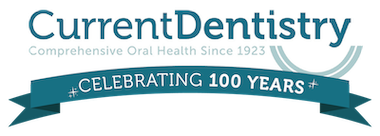Maintaining a clean dental office and following the strict dental sterilization protocol set forth by the American Dental Association (ADA) and the Center for Disease Control (CDC) ensures that both our dental practitioners and patients alike have a comfortable and safe experience.
The ADA encourages all dentists, dental hygienists, and dental laboratories to abide by the CDC guidelines for appropriate infection control, and here at Current Dentistry, we practice the appropriate infection control procedures that the CDC recommends. These procedures include:
- Hand hygiene
- Use of gloves, masks, and eyewear and other appropriate personal protective equipment
- Sterilization of dental equipment
- Disinfecting surfaces
Hand Hygiene
At Current Dentistry, we take hand hygiene seriously to protect our patients. Every practitioner who comes into contact with a patient uses disinfectant soap and water to wash their hands before and after each patient visit, before and after the use of gloves, and of course any time our hands become soiled.
Use of Personal Protection Equipment
Personal protection equipment, or PPE, refers to wearable equipment that protects our staff and our patients from exposure to possible infectious respiratory diseases. These items include gloves, face masks, eyewear, face shields, and protective clothing when necessary. All of these items are disposable and new, sterile equipment is used for each patient. Other equipment used to protect from disease include high-end air filtration to reduce aerosol as well as sneeze guard for the front desk.
Sterilization of Dental Equipment
Following the proper dental sterilization process is of utmost importance to maintain a safe environment for our patients and our staff. There are a number of ways to sterilize dental equipment, including autoclave sterilization and cold sterilization. Each dental office should have its own dental sterilization policy as we do here at Current Dentistry. We follow all manufacturers’ guidelines for our dental sterilization equipment.
- Dental autoclave machines, also known as steam sterilizers, use steam at up to 270 degrees Fahrenheit to disinfect reusable dental equipment after each use. The autoclave uses steam to inactivate resistant bacterial spores, fungi, bacterial, and viruses.
- Cold sterilization, sometimes known as chemical sterilization, is used for sterilizing dental equipment that cannot withstand high heat. Dental equipment in need of sterilization is placed into liquids called glutaraldehydes that kill most microorganisms. Equipment is left in the solution for three to six hours, depending on the product.
Disinfecting Surfaces
In addition to careful hand hygiene, use of personal protection equipment, safe use of sharps, and diligent sterilization of dental equipment, it is important to disinfect all surfaces in a treatment area in between each patient. At Current Dentistry, we use EPA-registered hospital disinfectant after each patient, following manufacturer instructions for use including amount, dilution, contact time, safe use, and disposal. We wipe down every surface, including countertops, computer equipment, trays, light fixtures and switches, and equipment handles.
At Current Dentistry, we work hard to maintain a safe and clean environment for our patients and staff. We want you to feel comfortable knowing that we follow all of the ADA and CDC guidelines to provide the best dental care possible to our community. Call us today to schedule an appointment!
Patient Testimonials
Dr. Will Current and staff are always so friendly and accommodating. I highly recommend Dr. Will Current because of his experience and always making me feel comfortable.
Dr. Current and his staff offered a unique and personal experience based on my needs and immediate wishes. Compassionate and receptive care. Best I’ve ever experienced.
I can’t say enough good things about Dr. William Current, Jr. And his staff. I have been a patient for 14 years and I must say they are highly qualified and experienced.
Get in Touch
Use our online form and we’ll get back to you shortly!
